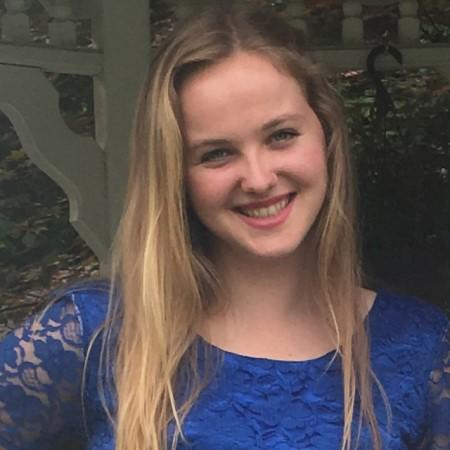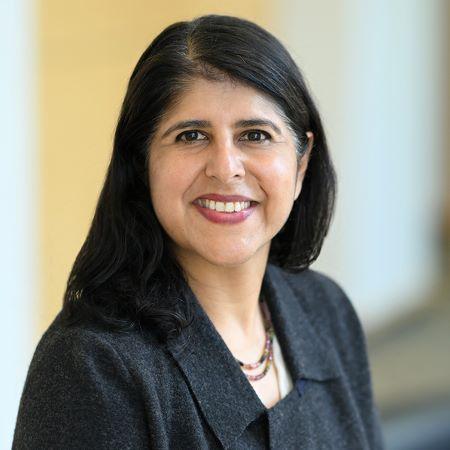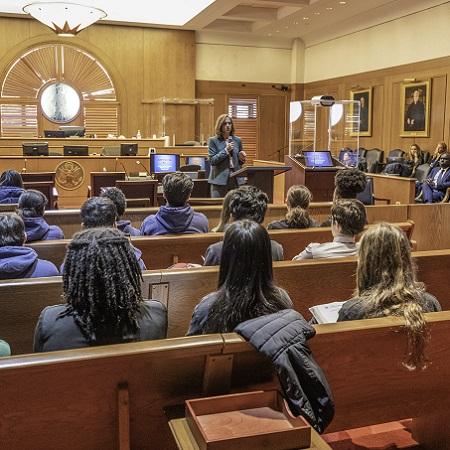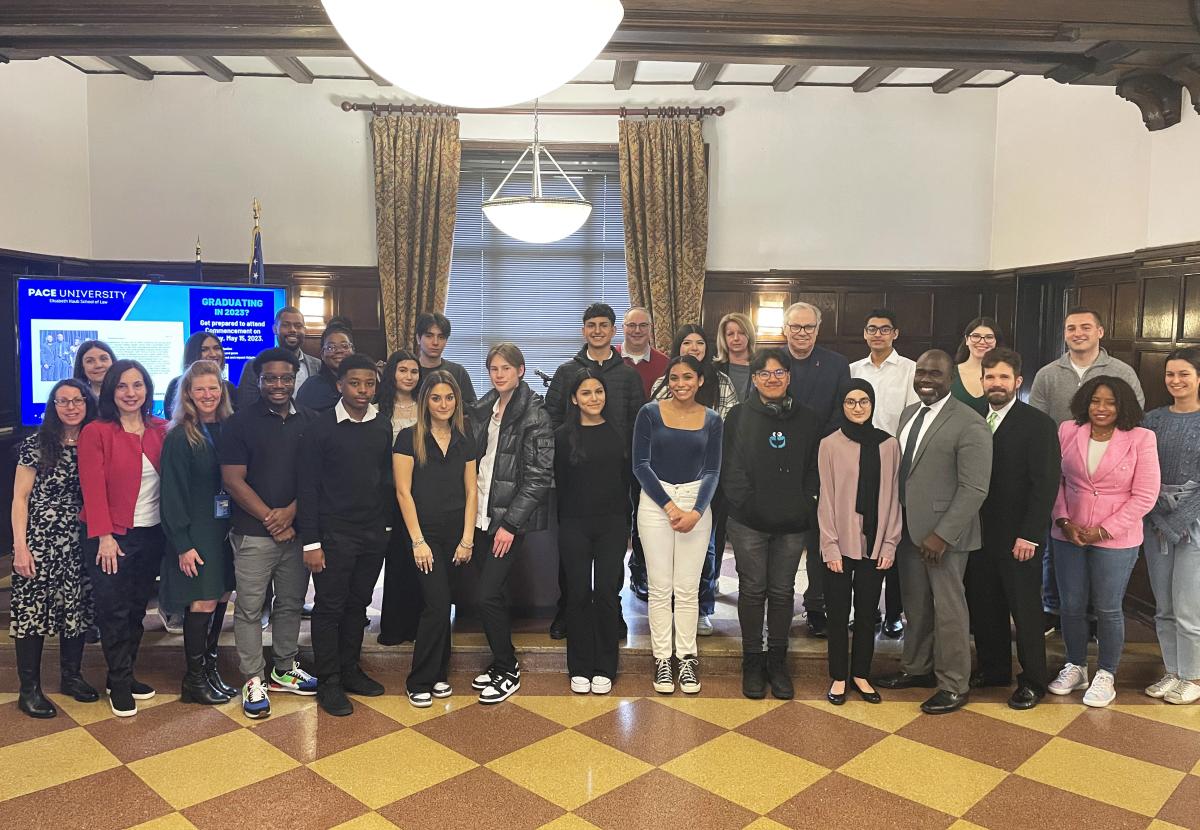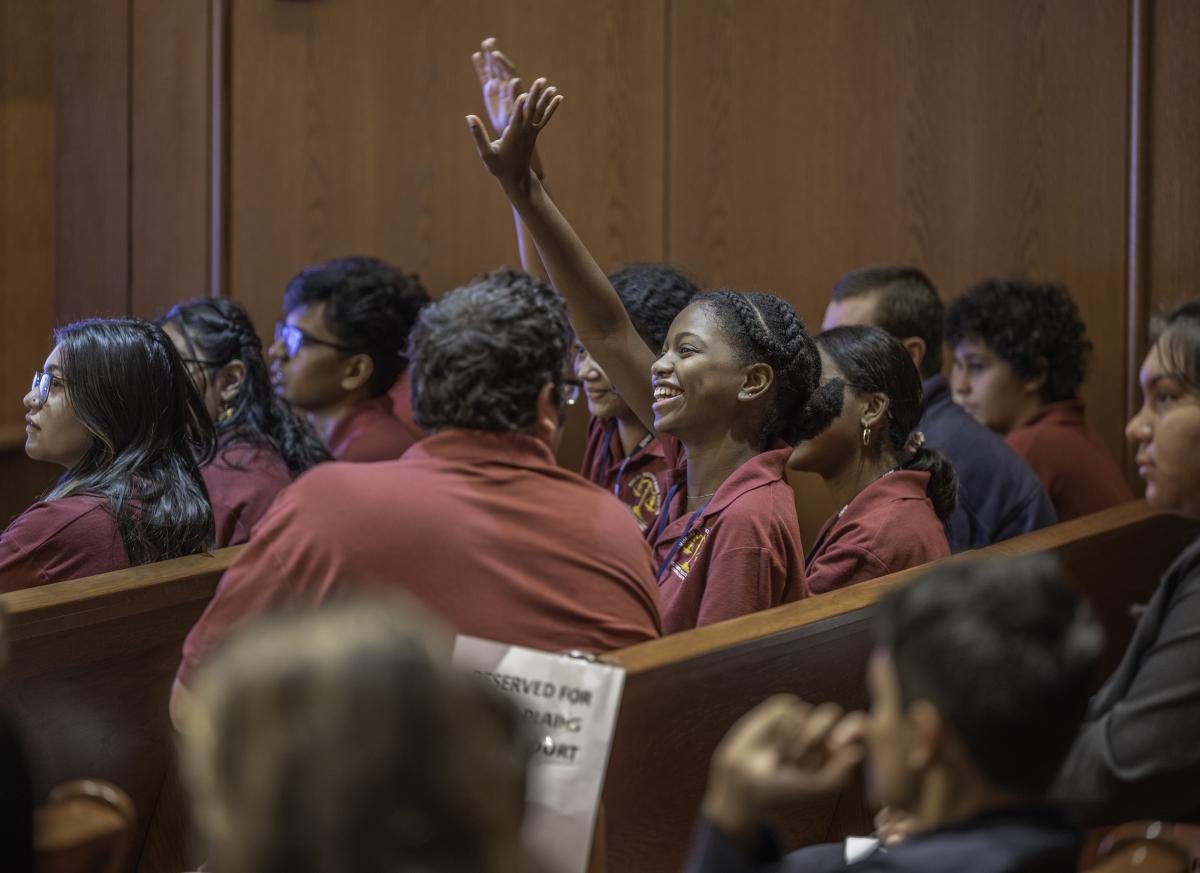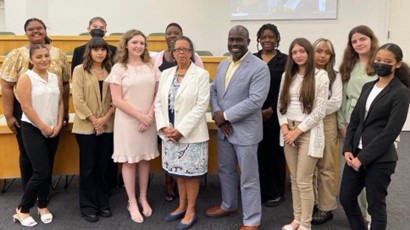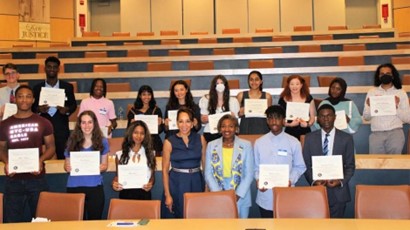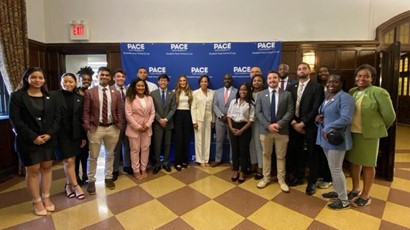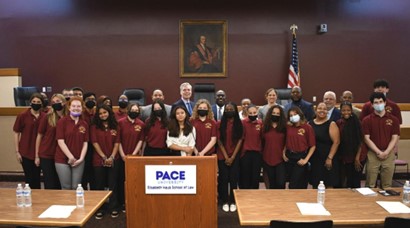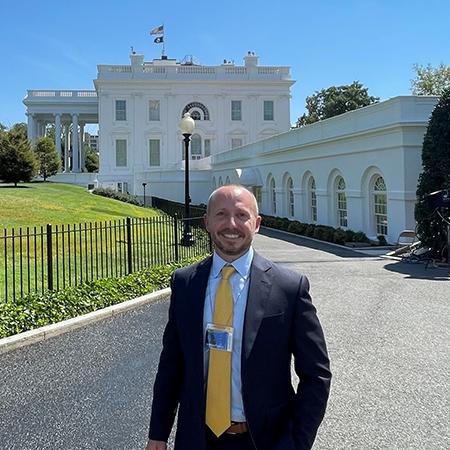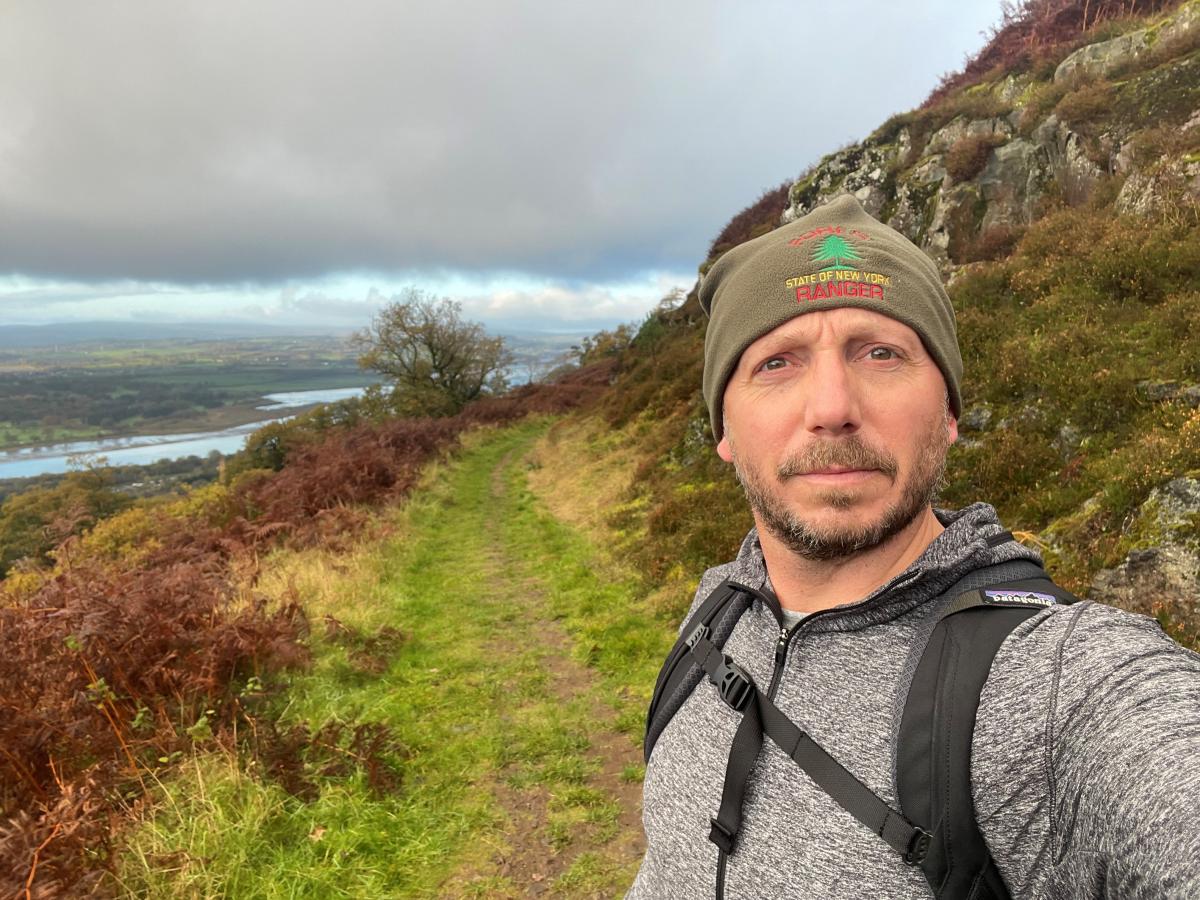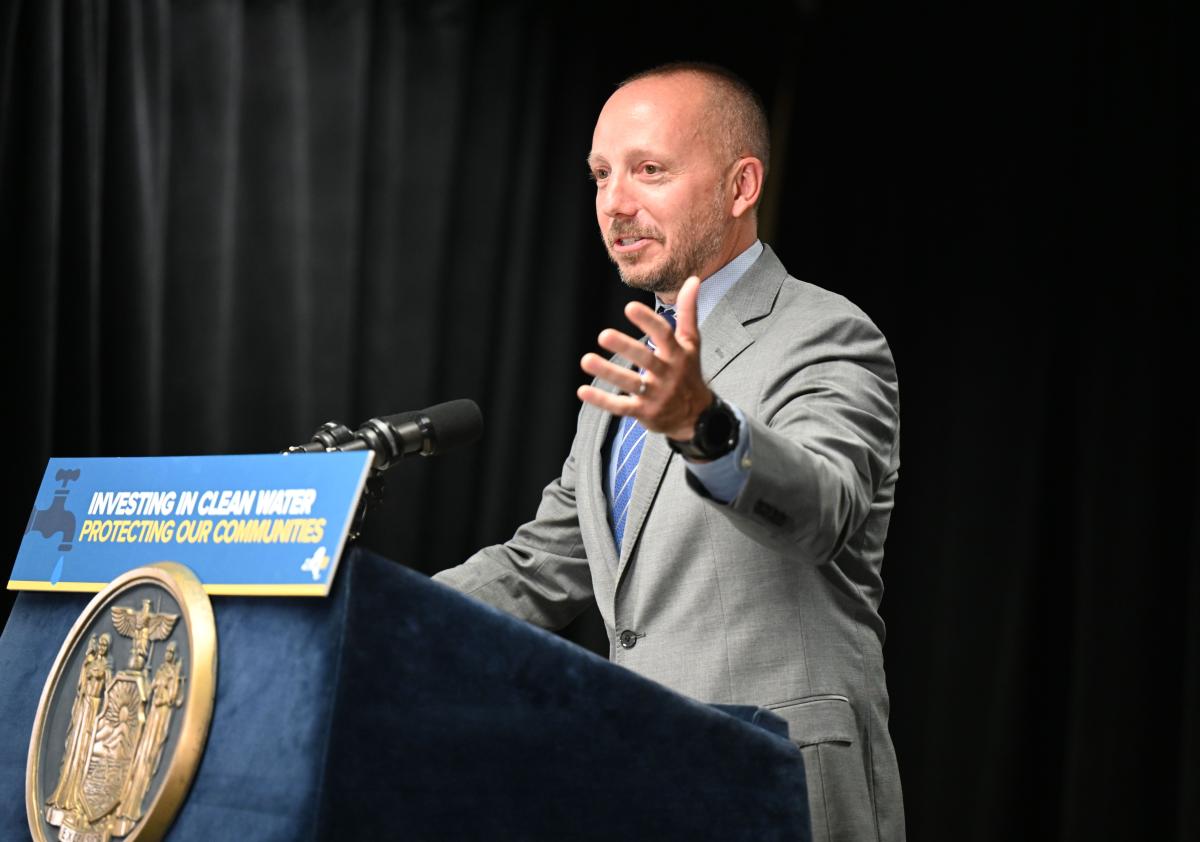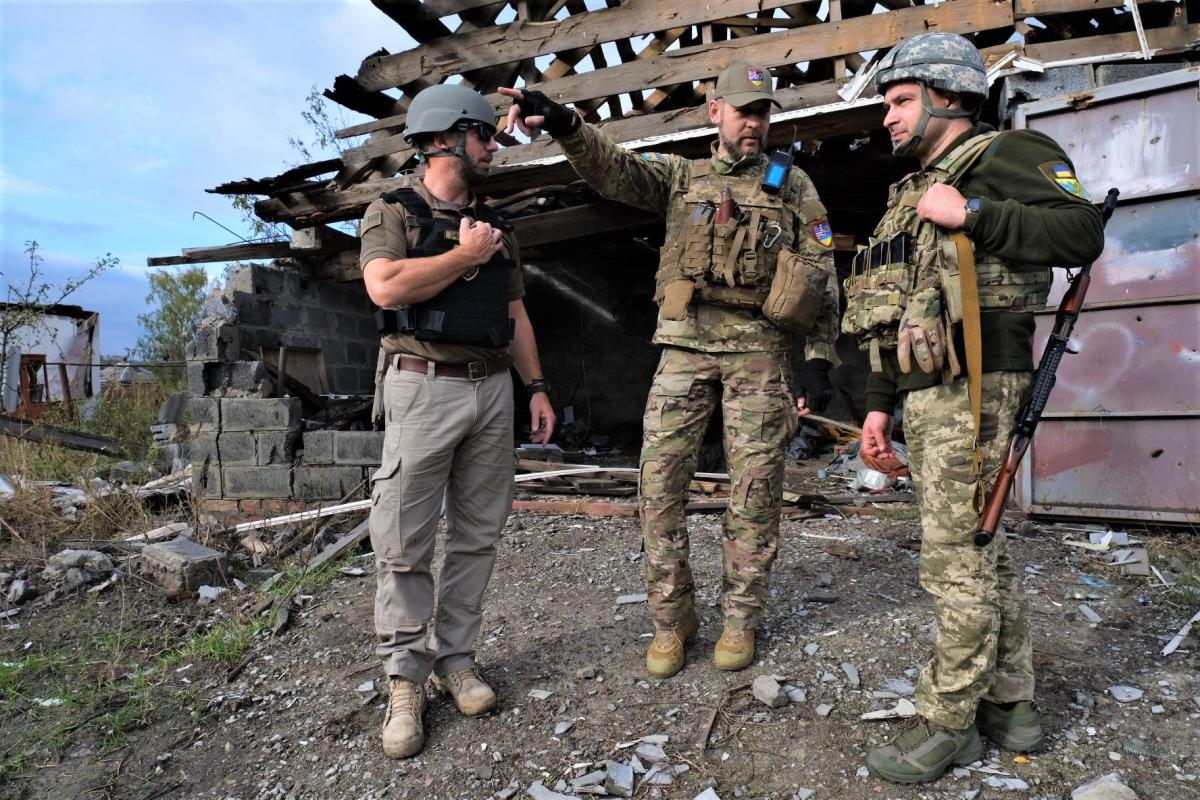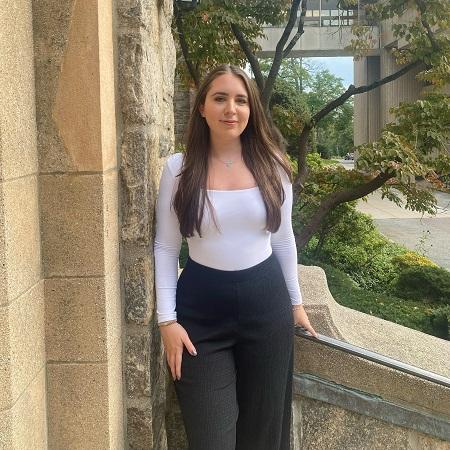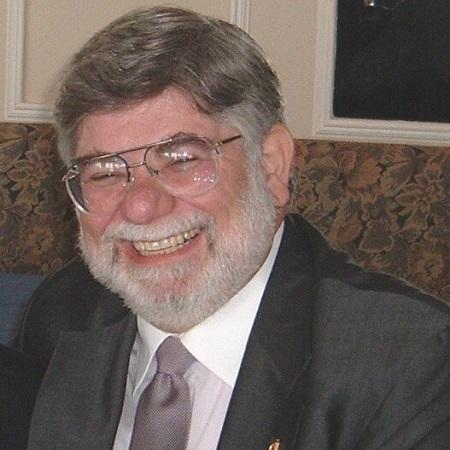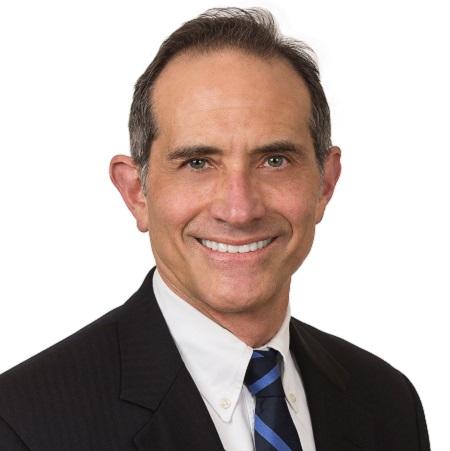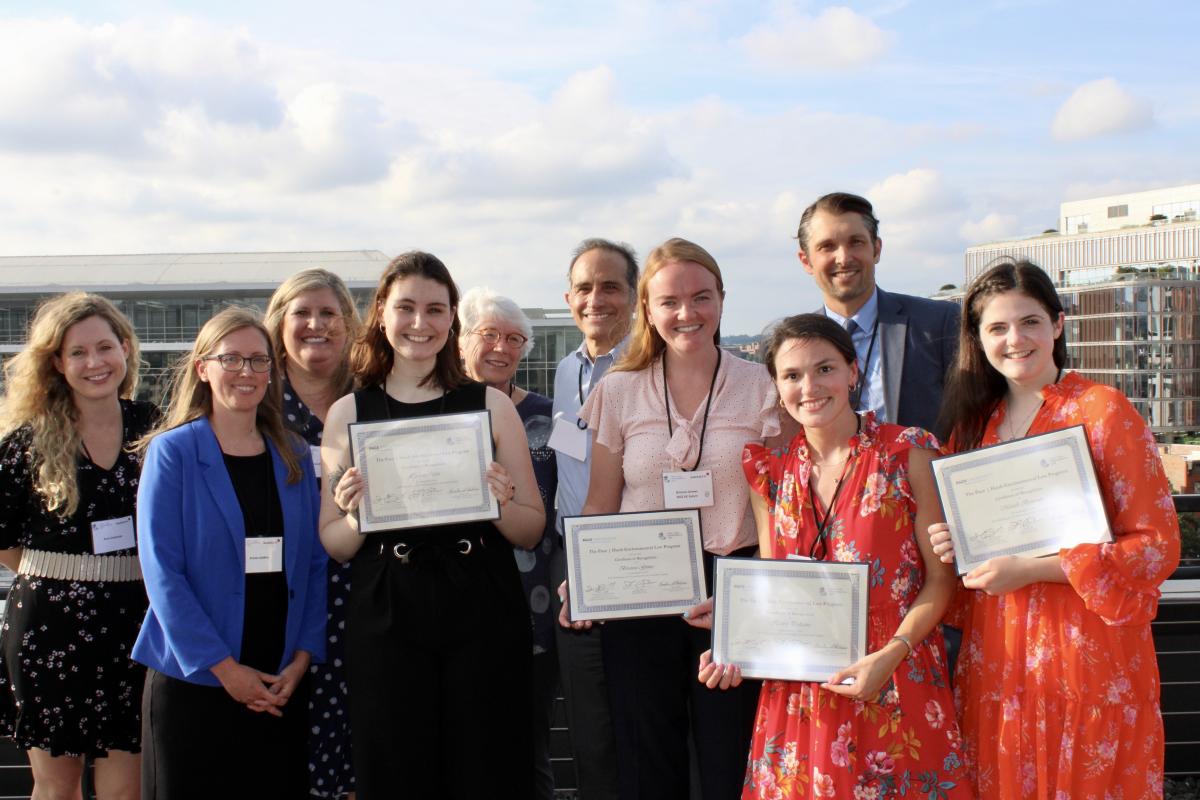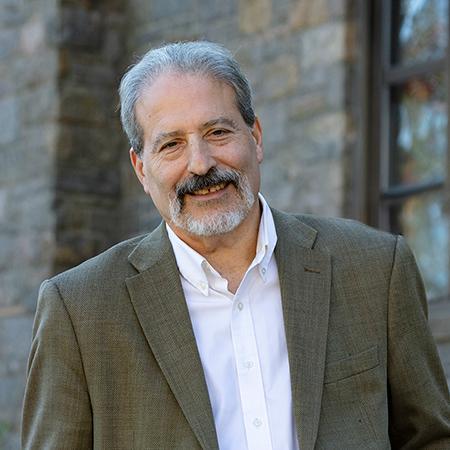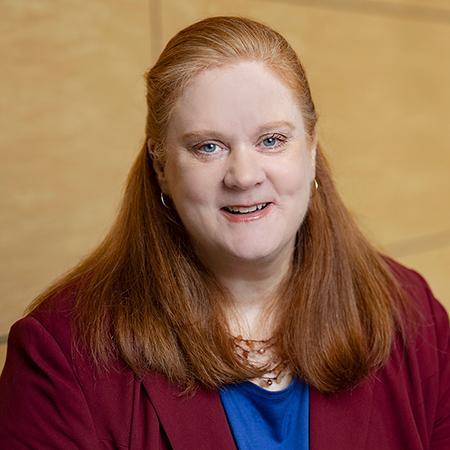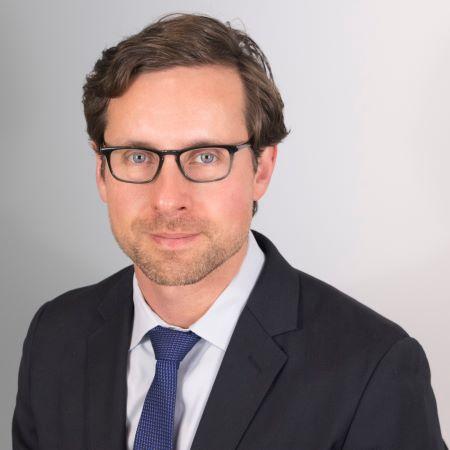Whether you walk into Professor Dorfman’s office or classroom, you will leave having learned more about the world and society then you even knew was possible. Professor David Dorfman has been a faculty member at the Elisabeth Haub School of Law at Pace University for 28 years. When Professor Dorfman first started teaching at what was then known as Pace Law in 1995, he was teaching Criminal Law Research and Writing. Today, Professor Dorfman teaches Criminal Procedure and Investigation, First Year Criminal Law, and New York Criminal Procedure - a course he designed himself. In the past he has also taught Lawyering and Professional Responsibility. In addition to his doctrinal teaching, Professor Dorfman has been running the Law School’s Criminal Defense Clinic since 2010. Learn more about Professor Dorfman’s background, legal journey, and more in this candid Q&A.
Q: What made you choose to go into a career in criminal law, specifically defense work?
A: This is a long story, but here we go. It is not like I always wanted to be a lawyer. I grew up in the city, specifically in a Mitchell-Lama Co-Op in Long Island City, Queens. In that section of Queens, there was a lot of street action and a number of the kids I hung around with got into legal problems. I was fortunate not to get into trouble and I attribute this to my parents. I was raised in a politically radical family, meaning they were always very politically involved. This dated back to the Great Depression. I was raised to think about poor people and people of color and the extent to which the criminal “justice” system and the “system” in general puts certain people in a real disadvantaged situation. I was raised to not trust the police or the system itself. Living in NYC, I witnessed firsthand some police brutality and how rough it was for those with a different skin color. I, myself, was the “right color” and did not experience the same treatment. Regardless, I always cared for the kids that I ran around with.
During my last year and a half of law school, I worked at a law office which worked white collar cases. Typically, the firm focused on crooked broker dealers on the Chicago Mercantile Exchange. This was essentially representing rich crooks and helping them keep their ill-gotten money in their pockets. I realized I wanted to help people in need, not represent rich people and aid them in getting richer. Around this time, the Legal Aid Society of New York City was conducting interviews in Chicago and I decided after 9 years in Chicago it was time to come home. I had my second interview with Legal Aid when I came back to New York. I was interviewed by the head of the Legal Aid Criminal Defense Practice, Cesar Cirigliano, and I quickly realized this was not an average interview, this was a “get to know you” op. This was 1987, there was a huge spike in crime rates in New York City and there was a desperate need for lawyers. The Legal Aid Society had their largest hiring year when they hired me. I requested to work in Brooklyn as it was close to family and friends, and I was pretty familiar with the area.
I worked as a criminal defense lawyer for the Legal Aid Society in Brooklyn for six plus years and enjoyed every minute of it. Criminal law practice back then meant constantly being in a courtroom and arguing, fighting, trying cases. I thrived on the hustle. To be completely honest, I still think of my Legal Aid job as the best job I ever had, it was just amazing. My last couple years at Legal Aid I was doing, along with the more senior trial lawyers, mostly major offense cases; this meant I took some of the hardest cases in the office many of which went to trial because plea bargains were terrible back then. In two consecutive years, I tried ten to twelve jury trials each year, so you do the math. This sort of pace was not uncommon back then for a senior trial lawyer. Each trial could take about two-three weeks so I did about 25 to 30 weeks of jury trials out of a 52 week year. Also add in the regular night arraignments, for which we would get compensatory time (not overtime). My life and that of my colleagues was arraignments, constant court appearances, trials and a month and a half vacation (using up that compensatory and vacation time), rinse, repeat. It was easy to burn out and trust me, I came close, but I loved the work and being in court every day. Among other things, I came to believe plea bargaining was just negotiating the terms of surrender. I’m sure you can tell, I am very competitive and like many of my Legal Aid colleagues chose to fight the system and (hopefully) win the case instead of backing down and settling. I believe everybody deserves to have someone fight for them and I guess sometime along the way I decided I wanted to be that person. This was very much the ethic of that office.
That was a really long answer to your question, but long story-short, I chose criminal law because doing public defense work allowed me to represent the people I grew up with, it fit my personality and my politics, and I like the battle because I am very competitive.
Q: Did you ever consider working on the other side in prosecution?
A: After taking the LSATs and getting into Chicago Kent College of Law, I first wanted to be a poverty lawyer, I didn’t know what a poverty lawyer did – all I knew was I wanted to help folks. Eventually, I took trial advocacy and my professor was a prosecutor. I took to advocacy fairly naturally and the professor told me I should pursue trial work because I “have a big mouth.” As I continued through law school, it became very clear to me I wanted to be a defense attorney because becoming a prosecutor was very much adverse to how I was raised. Oddly enough, I went to the State’s Attorney’s Office of Cook County for a job interview. The Assistant State’s Attorney at the time asked what my attitude toward the death penalty was and I honestly said I would refuse to prosecute a capital case. At that point, the two of us knew the interview was over, but we continued to talk until our allotted time was over.
Q: How did your parents feel about you going into law?
A: My father was a writer; he wrote comic books and juvenile fiction. My mother was a school teacher and my brother and sister were both artists. My father died when I was 19, so he never got to see me become a lawyer. I think he would appreciate my work because when he was younger, he was a union organizer. I think he had the same kind of fight in him when he was young and he would have related to my career path.
My mom was ambivalent because no one in my family was a lawyer. I don’t think she or my siblings understood the appeal of verbally fighting all the time and being competitive because it was not who they were. As I mentioned before, my family was radical when it came to politics and they loved to argue those kinds of issues, but going to court and the idea of wearing a suit was just not them. Eventually, I think they all came to appreciate it.
Q: Is there a case or moment in your career that stands out to you?
A: Oh yes, there are a lot of them. One in particular that stands out was a case I had when I was doing major offenses. This was back in the early 1990s, my client Casey was charged with armed robbery. This was not Casey’s first charge, he had four priors all for armed robbery. Due to his priors, he was charged as a mandatory persistent felon and if convicted he would be facing 25 years to life in prison.
Casey was a great guy, I liked him a lot. He was sent to Riker’s Island for detention because he could not make bail—bail was many thousands of dollars. It took a while to get to trial back then so by the time we got in front of a jury, Casey had already spent close to two years in Riker’s. During the time that we awaited trial, I thoroughly investigated the case and was convinced Casey was innocent, that the prosecutor’s case was flawed, that the only reason Casey was charged and not afforded a deal was because of his record. I also learned Casey had changed his life – he worked at the transit authority and had a young family whom he was trying to support. Casey was a soft spoken guy, nice to talk to, an absolute sweetheart – you could not square his personality with his terrible record. I looked at Casey’s record a little more carefully and noticed he had copped a plea on every case, even those when he claimed he was innocent. He had always gotten a pretty good deal, but this time there was no decent deal to be had and he needed to go to trial. Despite turning his life around, Casey felt like a loser and was understandably scared of trial.
Regardless of how Casey felt, trial was really our only option. At the hearing to suppress the lineup, the district attorney brought in the victim of the robbery to testify, to prove independent source because the lineup was very flawed. This hearing gave me the chance to play out the entire cross examination without a jury, to see how good of a witness the victim was. It turns out, he had been drinking the night of the robbery and even though there was good lighting, the robber’s face was backlit meaning his face was somewhat obscured. Additionally, the victim admitted that during the 10 minutes the robbery took place that he had been staring at the gun because he was so scared, and not the robber’s face. This was all good information to hear prior to going to trial in front of a jury. After this, Casey finally started to gain some courage and confidence. The other thing we had in our back pocket, was an alibi. Casey was married with kids, but he was having an affair. His mistress was a girlfriend from a long time ago and she had been with him at the time of the robbery. When I interviewed her, she confirmed the alibi in detail. Typically, a mistress would not the best alibi, but she had no incentive to lie because she now hated Casey for leaving her for his wife. The mistress admitted part of her wanted him to be convicted and sent upstate.
I knew putting on an alibi was always a dangerous move, but I loved the ex-girlfriend as a witness so much, and I knew she was rock solid on the facts. Typically, a jury will view an alibi witness warily, and will effectively shift the burden of proof to the defense. The burden to prove an alibi is one of the hardest burdens to carry. So, after the People’s case and their one witness identification evidence, I put the ex-girlfriend on the stand and the DA walked straight into the trap. He asked if she was going to lie for the person she loved and her response was, “I wouldn’t lie for that scumbag after the way he treated me.” It was absolutely perfect and when all was said and done, we got an acquittal. At the time of the verdict, I said to the judge “I move to have my client released right now.” It was typically protocol back then to bring the prisoner back to Riker’s to collect his possessions while Corrections did one final search through the system to make sure there were no other holds on him. It could create hours of delay. That day, the judge said he was not sending Casey back to Riker’s and instead told the Corrections officers to do their search for holds on the court computers. The computers were old at the time so this search took about an hour to an hour and a half. Needless to say, Casey had no other holds and was released from the courtroom. As we were going down the elevators in the old Schermerhorn Street courthouse, I turned to Casey and said “you haven’t eaten since lunch what do you want for dinner? What do you want to eat?” Casey said “I would love a really good hamburger.” We walked to a place called Grand Canyon Hamburgers and as we walked down the street in Brooklyn Heights, Casey was walking like a man on the moon and he was crying. Casey ordered a double hamburger with all the fixings. He was eating this burger like a man who hasn’t eaten in two years. He was slobbering and drooling. Quite frankly, it was embarrassing, but this is a guy who genuinely thought he was going to go back to Riker’s and then up to the Canadian border for the rest of his life.
This was very powerful. It reminded me of why I did this job. I don’t think I changed Casey’s life – the case lined up, the judge was fair, the alibi was amazing. I was just a part of something and it was really very meaningful for this guy who was a truly good person to finally find justice. Casey never needed my help again and we stayed in touch for a period of time, but at a certain point something about talking to me reminded Casey of all of the bad things and that part of his life that he wanted to close the door on, that long terrible chapter of his life. We haven’t connected since. Casey’s case was truly one of the most powerful experiences I have ever had.
Q: What made you want to become a professor and how did you start your career at Haub Law?
A: A friend of mine named Andy worked at NYU as a Lawyering professor and said I would be perfect for teaching. I applied to work at NYU for their Lawyering program – it was not a tenure track position, but it was a full-time contract professor position that capped out at three years. It was at NYU that I got the teaching bug. Anthony Amsterdam, the former Dean of Clinical Education at NYU, was my mentor and I learned how to teach from him. I stayed at NYU for 2 years. In 1995, I was hired and then started working at what was then called Pace Law on the tenure track. There was no separate Legal Skills course when I arrived. The school instead had a class that was comprised of Criminal law with a writing and research component incorporated into it. It was a perfect fit for me, and I taught this class for about 5-6 years exclusively. Eventually, the school realized I could teach other things. I started teaching Criminal Procedure and Investigation, the Lawyering/Simulations course with Professor Lissa Griffin, and Professional Responsibility. Around 2002, the woman who used to run the Criminal Defense Clinic, Adele Bernhard, took a year off and I took over the clinic in her absence. A year later when Adele came back, I still stayed somewhat connected with the clinic, consulted on some cases, sat in on some seminars. In 2010, Adele left and I officially took over the clinic as Supervising Attorney. All of the cases are in the Bronx and I have been at the clinic along with my adjunct team teacher Robin Frankel since.
Q: You have been very involved in some of the more recent protestor cases, can you talk about that?
A: I was a somewhat active member of the National Lawyers Guild (NLG), a leftist lawyer’s organization, and in 2016, I got a call from Joel Kupferman, a friend and colleague from NLG. He mentioned that there was a big protest happening by the Indian Point nuclear powerplant. There were environmental protestors protesting the installation of a high-capacity gas pipeline that linked fracking fields in Pennsylvania snaking through Jersey and New York and all the way up to New England. There was no real need for this pipeline since there was no gas shortage. In fact, the gas flowing through the pipeline was going to be liquified and sold commercially abroad. The whole process of extraction and transmission and the pipeline tech itself was incredibly dangerous. There were seven people that were planning to occupy the pipeline and I agreed to represent them. The protestors hopped a fence in Verplank, New York at 5:00 a.m. and four of them climbed into the partially installed pipeline. They were prepared with sleeping bags, backpacks, food, adult diapers, and water. They stayed in the pipeline for less than 24 hours (they left by midnight). They were all arrested as well as the three others that did not climb into the pipeline, but instead stood guard. I helped negotiate with the police to avoid their spending the night in jail.
I ended up representing those seven protestors for two years. We went to trial in Cortlandt Manor in Northern Westchester. They were charged with criminal trespass. None of them wanted to plead guilty and the DA would not make an acceptable deal. We wanted to mount a climate necessity defense; meaning that they were allowed to break the law if it was a necessity, to avoid a greater harm. Stopping this pipeline from being built was a necessity for three main reasons in our defense case: 1) this would help save the world from global climate change, of which methane gas is a main driver; 2) save the neighborhoods surrounding the pipeline compressor stations from leaked methane and carcinogens; and 3) save the whole eastern seaboard from the potential rupture of the pipeline, which would ignite the spent nuclear fuel rods at Indian Point, and make the whole east coast of the US uninhabitable. Think Fukushima. Think Chernobyl. Think Three Mile Island.
The trial took two weeks, it was the longest litigated climate necessity case in the US thus far, as well as one of the most complex cases I have ever litigated. The judge allowed me to try the case in the most complete way possible. I had expert testimony from a variety of Incredible professionals—a world renowned climate scientist, a public health expert, a nuclear engineer. Due to this case’s unprecedented nature, it gained a fair amount of press. Unfortunately, we did not get the protestors the acquittal we had hoped for. But they were only convicted for non-criminal trespass; there was no sentence, no fine, no court costs imposed. Nothing. The judge even said to them, “I do not want to deter your activism.”
Q: If you could create a new course tomorrow, what would it be?
A: I taught a seminar with Professor Michael Mushlin and the late Professor Gary Munneke. It was a legal history course centered on the history of civil rights lawyering. It focused mostly on the lawyers and law organizations that went to the South in 1964 during Freedom Summer. I believe civil rights lawyering of that era has been extraordinarily influential on our whole concept and practice of public interest lawyering and not talked about nearly enough. I would like to do seminars on legal history but find interesting areas that are not often studied in law school. Then I would bring in unconventional materials like historical readings, films, diaries. I would want it to be a two credit-hour seminar on the underappreciated and understudied areas of legal history. I would love to have students read, watch films, and talk about the cases and the type of lawyering that happened. I don’t want students to just focus on the cases in casebooks, their holdings, and then passing the bar. I want to teach students the fuller view of these important historical moments, the movement lawyering, and the personalities involved. Law does not operate in a vacuum and sometimes, I think that is forgotten. In that connection, I think it would also be interesting to do a seminar on the Vietnam War, the protest movement, the cases involving people like Dr. Benjamin Spock and the Berrigan Brothers and Dr. King.
Q: What is your favorite part of being a professor?
A: I like seeing students do well. I like my colleagues a lot and have good relationships with them, but the students are why I love my job. I am not an institutionalist, I love the school, but I love it for the students. I enjoy watching them learn and flourish. It is a great feeling watching the lightbulbs go off.
I am very political and have strong views so I enjoy teaching in a way where I teach to those that may not agree with me. I don’t want to have to hide who I am or lose my soul. I like the challenge of being a good devil’s advocate. I think someone can come out of my class learning a lot and appreciating my viewpoint without having to agree with me. I always aim for the sweet spot of teaching – even though I know I am sometimes a tyrant in the classroom. The most gratifying part of teaching is being able to do it without a personality transplant. And watching the students succeed.
Q: If you weren’t a law professor, what would you be?
A: Back in the 1970s before going to Chicago, I wanted to be a writer/novelist. I would write essays, fiction, and poetry. I wrote a number of articles for Art Form Magazine with my brother. One day, the editor of Art Form, Joe, said I should apply for a grant because my brother and I had a book in us. I applied for the Art Critics Grant from the National Endowment for the Arts and received $4,500 to write a book. My brother and I completed the book, but unfortunately it never got published.
Recently, my brother wrote a different book and it was published. In his new book, my brother used some of our old material from the previous book. His new book is called, “Out of the Picture.”
So to answer your question, maybe I’d write fiction or essays on politics and culture. Probably not law.
Q: What do you do in your free time?
A: I spend time with my wife hanging out, we love to cook together. My wife and I like to travel too, but with COVID we haven’t been able to travel as much as we would like. We visit our children and grandchildren when we have time.
I like to read fiction, I am always reading a novel. I feel it is really important to occupy the other part of my brain, the part that gets going when I read good fiction. I specifically like genre fiction –high quality spy novels, detective novels, etc. I should exercise more, but with my bad back I don’t. I do walk a decent amount with our beautiful old dog. Lastly, I like to play guitar. It sparks the same part of my brain that reading good genre fiction does. It is one of my connections to my artistic roots.
Q: If you had one phrase to live your life by, what would it be?
A: Mickey Rivers, a former centerfielder for the New York Yankees, used to say: “I don’t worry about things I can’t control because I cannot control them. I only worry about things that I can control because I can control them.” I try to live my life by this line. It is easy to get stressed out about things and I try not to fall into the trap.
Q: What is one piece of advice you would like to give to law students?
A: I try not to give too much advice and instead help to create situations that people are learning from by spending time with me and the materials. A political activist and incredible attorney, Ralph Nader, once said, “the problem with lawyers is that in order to get sharp, they get narrow.”
I like to get students to think about that line. Everyone wants to be good at what they do and in order to do that they become very analytical and focused. This is what being narrow is. I believe to be a good person and frankly to be a good lawyer, you need a broad view, to see other things and perspectives. It is important to preserve broadness by finding other things to care about. That is why I continue to travel, read novels, have friends who aren’t lawyers, still love art and music. I refuse to get narrow, and I still aspire to be a sharp lawyer and thinker. I think being too narrow makes it hard to live a good and full life and you need to remember that you will have a life apart from the law and after the law.
Learn more about Professor Dorfman.
